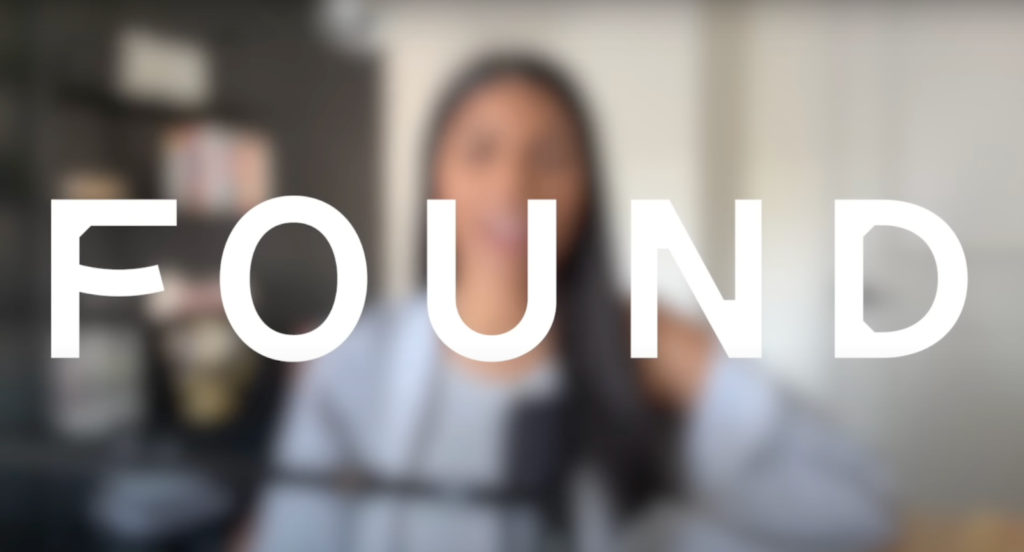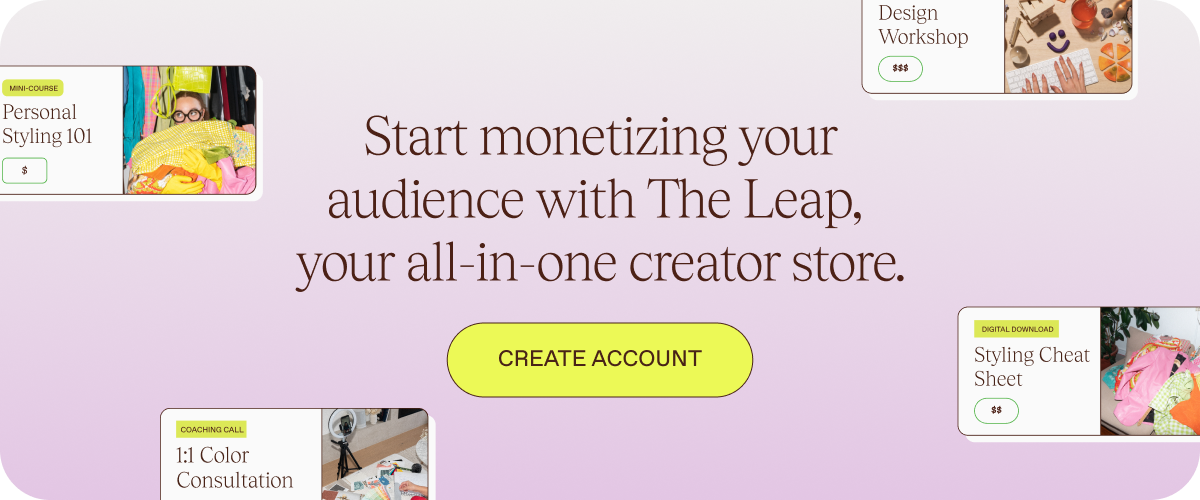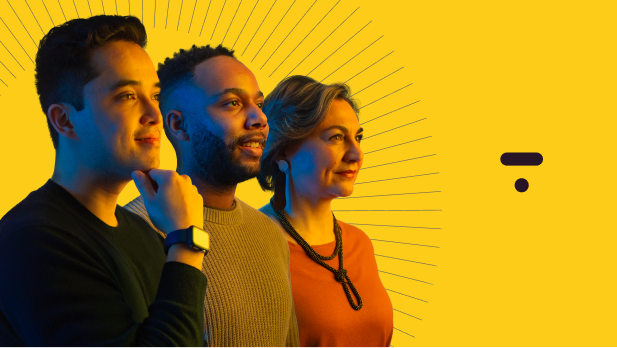In recent years, podcasting has emerged as an exciting content channel for creators. Riding the wave of social media expansion, podcasts have naturally grown in popularity.
It’s become easier than ever to connect with an audience and build a following on digital platforms, podcasting included. All kinds of creators – from entertainers and influencers to teachers and corporate professionals – can benefit from podcasting.
The challenge for many creators is understanding how to make money podcasting. While there isn’t a single revenue model every creator should follow, as we’ll discuss, there are tons of monetization methods you can use to create a stable and profitable podcast.
Whether you’re beginning without an audience or starting with a sizable follower base, growing and maintaining a podcast takes time, dedication, and plenty of effort. In this article, we’ll share tips from an expert podcaster making seven figures, and explore models and tactics you can use to build a profitable podcast. Let’s get started.
Skip ahead here:
- Tips on podcast monetization, from a seven figure podcaster
- How to make money podcasting: identifying your monetization audience
- 10 podcast monetization methods
- Podcast monetization do’s and don’ts
- The final word on how to make money from a podcast
- Podcast monetization FAQs
Tips on podcast monetization, from a seven figure podcaster
Before diving deep into the strategies of how to monetize a podcast, let’s set the stage with some tips from Kate Erikson of Entrepreneurs on Fire, a successful podcast with over 2000 episodes, one million + listens per month, and a seven-figure annual revenue.
Why is it a good idea to launch a podcast?
Podcasting was invented in 2004, the same year as Facebook, ushering in a new era of content consumption similar to the impact of social media. Like TikTok, Instagram, and Twitter, podcasts have democratized the media landscape, giving entrepreneurs and small businesses the power to engage their target audience without the need for enormous marketing and production budgets.
According to the Pew Research Center, podcast listenership has more than doubled over the last decade, and listeners are tuning in more frequently. Podcasting isn’t just another platform, it’s a unique channel with unparalleled advantages — and a thriving market.
Here are a few of those advantages:
- Intimate connection – Podcasting lets you speak directly to your target audience. By delivering free, valuable, and consistent content, you can create an almost immediate “know, like, and trust” connection with your listeners. The intimate relationship that is created through audio is incredibly powerful.
- Free and on-demand – Podcasting is easy to access. All of the major operating platforms (like iOS, Android, and Google) allow listeners to tune-in on their favorite devices. And listeners don’t have to say “no” to what they’re doing at the moment to engage. They can listen for free, anywhere, anytime – whether they’re shopping, working out, driving, or doing housework.
- Reach – Podcasting is a marketing channel and growth opportunity you can own. Podcast hosting platforms allow you to distribute your content, but they don’t own it. With your own podcast, you can reach listeners worldwide, sharing your products, services, and offers for free.
Inspired yet? Before you jump into podcasting, let’s take a look at what you can expect in the formative stages of starting your podcast journey.
What’s it like in the early days of launching a podcast?
Starting a podcast requires a lot of work. In the early stages, you have a lot of decisions to make. These are a few of the big ones:
- What topic will you focus on?
- What podcasting platform will you use?
- Who is your listener persona (your ideal podcast listener)?
- Will you do a topic-based show, an interview show, or a combination?
- How long will your episodes be, and how frequently will you publish them?
- What equipment and software will you use?
- How will you promote your podcast?
Luckily, there are a lot of amazing resources out there that can help, like this Free Podcast Course. Remember, you can always pivot or change course down the road. The most important thing in the early stages is that you keep working, experimenting with new methods or strategies, and listening to your audience. Try to find what resonates most with your listener persona.Once you’ve launched, it’s all about getting the word out and growing your audience. For the first couple of years, you should really only be focused on launching your podcast and growing your listenership.
How do you build a revenue stream through podcasting?
Here is what Kate Erikson has to say about making a consistent income through podcasting:
“Beginning with your very first brainstorming session, your full focus should be on providing value to your audience. Take the advice of Albert Einstein: “try not to become a man of success, but rather try to become a man of value.” I put my head down and focused on becoming the best daily interview podcast to exist.
Granted, this wasn’t too hard as I was the ONLY daily interview podcast; however, I was determined to improve and provide more value over time. This meant I had to become a better podcaster, which included becoming a better interviewer, guest coordinator, and marketer.
My first step in monetization? Listening. As I continued to put in the work, listeners began reaching out to me. They were asking for coaching calls and books and online courses.”
Unless you have a large loyal following already, podcast monetization isn’t something you can pull from thin air. Monetizing your podcast comes from growing your audience and listening to what they want from you. In Kate Erikson’s podcasting journey, this resulted in the following monetization methods:
- Coaching
- Sponsorships
- Affiliate partnerships
- Online courses
- Speaking gigs
- Masterminds
- Events
- Journals and books
Once your listeners have made consistent and repeated requests, you’ll have an idea for a product or service. The next step is to test the waters, asking your audience if this is something they’re willing to pay for. In business terms, this is proving the viability of your concept.
Once you’ve proven the concept, you can move forward with development and begin creating your product or service. Build a marketing funnel to drive listeners to your offering, and then scale the offering to reach a broader audience.
How to make money podcasting: identifying your monetization audience
From a monetization perspective, podcasts cater to two distinct audiences. Identifying and understanding these two groups is the first step in learning how to monetize your podcast.
The first audience consists of your listeners. You probably think of these people when you hear the term “audience.” In this article, we’ll refer to them as your “content consumers.”
The second audience includes both people and companies, and this group is interested in paying for access to your listeners. We’ll refer to this second group as your “sponsors and affiliates.”
Both groups value your content, but in very different ways. Content consumers often listen to learn something new, develop a skill, or simply relax and have a laugh. Sponsors and affiliates, on the other hand, are attracted to your target audience because your listeners may be interested in what they have to offer.
Most successful podcasts engage both audiences to create a successful and sustainable monetization strategy. However, the perfect balance will vary from show to show. Some podcasts may rely entirely on sponsorships and affiliates, while others only rely on listener support. Most will fall somewhere in between these two extremes.
Next, let’s take a closer look at what engaging content consumers and affiliates and sponsors might look like for your podcast.
Engaging content consumers
Selling content directly to your audience
In the context of podcasts, consumer-based funding is monetization that relies on direct financial support from your listeners. This kind of funding can include selling online courses, merchandise, subscriptions, premium content, and more.
Asking your audience to support your podcast can be awkward. But despite the discomfort, it’s one of the funding paths that helps keep your show independent.
To make money podcasting, we recommend diversifying your monetization strategy. Ideally, this means you should keep multiple monetization methods open at all times, leading to a more stable and secure income overall.
Here are some of the pros and cons associated with consumer-based funding:
Pros and cons of monetizing the consumer
Pros of monetizing the consumer Cons of monetizing the consumer Affiliates and sponsors can come with lengthy contracts and terms – monetizing the consumer doesn’t. “Selling yourself,” or your products and services, is a skill that makes many people uncomfortable, especially when you’re just starting out. Your podcast can potentially make an above-average income from a relatively small but generous audience. Your podcast audience may not be financially capable of supporting you. Off-platform donations, like PayPal, are an effective way to get around platform commission and fees. The normalization of funding requests may mean your listeners are tired of hearing creators ask for donations and direct support. Consumer-based funding can be expanded as needed. Whether you need more equipment or are supporting a charity, you can choose how and when to be vocal about your need for funding. Time spent asking for support can divert listener focus from the content, possibly affecting the overall quality of your show. Engaging sponsors and affiliates
Selling access to your audience to brands
In the context of podcasting, engaging sponsors and affiliates refers to the practice of working with brands and retailers to generate income.
Here’s how: sponsors and affiliates either pay directly or incentivize you to promote a person, product, or offering. This exchange gets their offering in front of your listeners, and you get paid.
Affiliate programs are the incentivizers. In exchange for promoting a product or service, you get a specified amount from every sale you generate. The most common example of this is Amazon Affiliates. Sales are typically tracked through special links or discount codes generated by the brand.
Sponsorships make up the other half of this monetization audience. Sponsors are companies willing to pay for a brand message to be added to your content. This can be done directly, usually with a contract between the sponsor and the show, or indirectly through an agency.
Done poorly, affiliate marketing and sponsorships can clash with the style, tone, and overall vibe of your podcast. To avoid this disconnect, implement this monetization strategy carefully, choosing only the most relevant and valuable partners.
Take Latasha James for example. Latasha is a course creator, YouTuber, Social Media Marketer, and freelancer. In a video about becoming a freelance social media manager, she takes on Found, an app that handles banking, bookkeeping, taxes, and invoicing, as a sponsor.
This sponsorship is highly relevant to her target audience: freelancers. In other videos, like Podcasting for Beginners, she shares her tech set up and uses affiliate links, driving revenue from any sales made while also creating value for her audience.
Pros and cons of sponsors and affiliates
Pros of sponsors and affiliates Cons of sponsors and affiliates Affiliate marketing and sponsorships can be more reliable than donations or similar consumer-based funding. Advertiser revenue can be prohibited for incompatible or controversial content, also known as demonetization. Creators often face this challenge on YouTube. Sponsorships can be lucrative depending on your listener loyalty, niche, and audience size. Creators often have to meet specific audience metrics before they can take on affiliate, sponsor, or ad channels. Tax paperwork and other record-keeping can be simplified with documents from agency partners. Sponsors can impose highly specific requirements for messaging, sometimes scripting a promotion word for word. This can be too limiting for some creators. Commercial messages played before and after a podcast don’t usually interfere with content. Sponsored content generally requires disclaimers, which may hurt your perceived credibility and authenticity. 10 podcast monetization methods
Like we said before, your podcasting monetization strategy will likely encompass your content consumers and sponsors and affiliates. Early on in the life of your podcast, you might have to experiment with several funding options until you have a model that works well for your show.
Here are 10 of the most common podcast monetization methods. To keep things simple we’ve divided these methods into two groups that align with your two audiences.
- Podcast monetization with your content consumers
- Podcast monetization with sponsors and affiliates
Podcast monetization with your content consumers
For most people, starting a podcast means you’re starting with no audience. Because your show hasn’t grown a following yet, sponsorships and affiliates probably aren’t available to you. That’s where monetizing your content directly with your content consumers comes in.
These monetization methods allow you to build income streams without a massive audience. Here are six ways you can do that:
Paid subscriptions and exclusive content
Nowadays, many popular social media platforms allow you to offer paid subscriptions and exclusive content. To capitalize on this opportunity, you should first identify where your audience is most active. Then, as you build your audience, begin building premium content offerings. This could include things like exclusive Q&As, workshop sessions, and webinars.
When the time is right, you can begin to offer this premium content behind a paywall, effectively monetizing a small portion of your content that is even more valuable and beneficial to your audience than your day-to-day content.
Online courses
If your podcast is educational in nature, your subscribers may be interested in signing up for an online course. Platforms like Thinkific make it easy to package your knowledge, create valuable courses, and distribute that content in engaging ways online.
We find that this monetization method is excellent for almost everyone. Some of our most successful creators have courses on Microsoft Excel, photography, social media, and even roller skating.
Books and e-books
Authors have discovered new side-hustles as podcasters. A popular podcast can reach thousands or millions of potential book buyers for everything from creative fiction to how-to guides.
Digital products
Digital products are virtually (pun intended) any item you can sell online. These products are not physical, so there’s no need for inventory, shipping, or other physical supplies. All you need is some time, a good idea, and maybe some graphic design skills or a graphic designer. Examples of digital products are ebooks, templates, guides, online courses, digital artwork, music or sound clips, and software.
If you’re trying to teach a skill like photography, a comprehensive digital guide to purchasing the necessary gear would be extremely helpful for beginners. Or, let’s get meta and say you’re a podcaster talking about podcasting. A downloadable template with ChatGPT prompts for a podcast could be a great digital product.
Crowdfunding and donations
As we discussed earlier, asking listeners for support is uncomfortable for most beginners. To ease that discomfort, we’ve gathered a few tips to help make crowdfunding easier:
- Be transparent – Communicate where the funds are going and how they’ll support your show or directly benefit listeners.
- Be genuine – Authentically connect with your listeners on an emotional level by sharing personal stories or your vision for the podcast. Explain why their support matters so much.
- Demonstrate your appreciation – Your show wouldn’t be a show without listeners. So, regularly thank your listeners and publicly recognize those who help fund your content. Thank you notes, shoutouts, story features, and other meaningful expressions are good ways to show your appreciation.
Thankfully, crowdfunding platforms make this monetization method easier than it’s ever been before. Popular platforms include Patreon, Kickstarter, Indiegogo, GoFundme, and Buy Me a Coffee. These platforms will offer a range of funding options, with varying fees, and different payout methods. Make sure to shop around and find the one that best fits your needs.
Merchandise
In 2023, offering merchandise doesn’t mean you have to spend months developing products and building an inventory in your garage. Companies, like Teespring for example, allow solopreneurs and small teams to create merch on demand and ship directly to consumers.
Popular swag items include T-shirts, cups, socks, hats, and other regular household items. For the best results, create merch that reflects your brand. For example, if you’re podcasting about elementary education, consider making planners for teachers. Or if you’re a fitness instructor, try making workout gear.
Once you have an avenue for creating, selling, and distributing your merch, you can begin to promote it to your audience.
Podcast monetization with sponsors and affiliates
If you have a larger following, you may be able to attract brands willing to pay for access to your audience.
Here are a four ways to make money podcasting with sponsors and affiliates:
Affiliate programs
Affiliate programs can dramatically expand your options for making money from a podcast. These programs work by incentivizing you to drive sales to another person or company’s offering. Affiliate programs are available for everything from books and online courses to Amazon and Target products.
Each company will likely have a different approach to affiliate marketing, which means this method can become a lot to track on your part. Affiliate agencies and large companies like Amazon can help make the process easier by giving you access to a lot of products or companies in one place.
Begin this monetization method by looking for programs with companies your audience already buys from. If you’re a fitness trainer, that might mean researching affiliate programs for protein supplement companies. Or if you’re a pet trainer, it could mean becoming an affiliate for a brand like PetSmart.
Sponsorships
Sponsorships can be a lucrative source of income for your business, with deals ranging from a few hundred dollars to tens of thousands of dollars. How much you can earn all depends on your audience, your niche, and whatever metrics potential sponsors care about.
As a podcaster, you can wait to be approached by a sponsor, or you can approach companies you think could fill the role. Regardless of how you earn a sponsorship, it’s important to know your worth and advocate for your show. If sponsorships become a regular source of income for your podcast, it might make sense to consider adding an agent. Agents can find sponsorships and navigate the negotiations for you.
Product placement
Product placement is similar to sponsored content, but it more often involves showing the product on-screen or simply talking about how you use a service. For example, a podcast on personal finance may include a demo of how to use a personal investment app. This can be a controversial method for making money through a podcast, and depending on how you do it, it might even be illegal in countries such as the UK, where strict laws govern native advertisements.
4. Guest appearances
Occasionally, paid guests might want to appear in your podcast. Some guests are willing to pay for an appearance when they have a product or service to offer.
Paying you for access to your audience can be an effective way for these guests to advertise or raise their public profile, and it can also be an effective way to raise yours. You can also trade guest appearances with other podcasts to raise each other’s profiles. If you’re familiar with building a website or SEO, this method is similar to building backlinks.
Podcast monetization do’s and don’ts
If you’re looking to monetize your podcast, there are a few things you should keep in mind as you develop a revenue model.
Do Don’t Research, define, and understand the audience you’re actively reaching and the audience you want to reach. Sometimes, the audience you engage with isn’t the audience you were expecting to reach. Expect to succeed overnight. Unless you’re starting a podcast with an established and loyal following, it can take months or even years to grow a listenership you consider “successful.” Start thinking about monetization options as early as possible — even before you’re fully ready to monetize. This is especially true if there are rules for monetization programs, like YouTube ads. Mix your funding streams or oversell to your audience. For example, don’t begin placing tons of ads in premium podcast episodes. Your listeners probably paid to avoid those pesky ads in the first place. Develop the right tools for social media promotion, as well as a backup plan in case one revenue stream randomly fails. As the saying goes, “you don’t want all of your eggs to be in one basket.” A diverse strategy is a secure strategy. Cut corners with your audio and visual equipment. This doesn’t mean your equipment has to be the most expensive equipment on the market, but it does mean you should invest in high-quality supplies — especially your audio equipment. Create a promotional plan and launch it across all kinds of platforms to get as much visibility as possible. Come on too strong. Many of your promising followers can be driven away by a heavy-handed appeal for crowdsourcing. Network. Feature other creators, and ask for shout-outs in exchange. This can help your show attract listeners engaged with other shows on similar topics. Overwhelm your audience with ads, sponsor messages, appeals for support, and other sales pitches. The final word on how to make money from a podcast
Podcasting is a very exciting and promising way to reach an audience of people interested in what you have to say. It’s not the only route to monetization, however, and you shouldn’t limit yourself to just one path. Incorporating your podcast into a multi-channel and multi-platform network consisting of online courses, memberships, digital products, and multiple affiliates can help you grow your show and potentially make more money from a podcast you put a lot of hard work into.
Podcast monetization FAQs
How do podcasts make money?
Successful podcasters can earn a comfortable living using a range of monetization methods. These methods may include affiliate programs, sponsorships, paid subscriptions, selling digital content, merchandise, and crowdfunding.
How much do podcasters make?
There is no limit to how much a podcast can make for you. Joe Rogan, the host of the Joe Rogan Experience, reportedly earned $100 million for an exclusive podcast contract with Spotify in 2020; and Entrepreneurs on Fire makes over seven-figures of annual revenue. While growth is often slow in the beginning, and you might have to get by on pocket-change or savings for months or years. A good monetization strategy could have your podcast making hundreds or even thousands of dollars an episode once you’re established.
When should I start thinking about monetizing my podcast?
You should start thinking about monetizing your podcast as soon as you can. Ideally, your monetization strategy will be part of your podcast planning well before you even record your first episode. The earlier you begin this planning, the more prepared your podcast will be to dive into monetization when you’re ready.
How big does my following need to be to monetize?
There is no one-size-fits-all approach to monetizing your content. With affiliate marketing and consumer-based funding, it’s possible to begin earning money with just one follower. However, if your goal is to secure brand deals, sponsorships, or ads, you’ll need to reach the milestones of various agencies and platforms.
For podcasts, agencies will likely want to see several thousand listeners per episode. But it’s possible to begin earning sponsorships, guest appearances, and product placement deals with only a few hundred listeners.
How long does it take to start making money from podcasting?
Depending on the current success of your brand and the size of your audience, your podcast can start making money with its first episode. However, podcasts starting without an existing audience will likely take several months to develop stable income streams from various monetization methods.
Can you make money podcasting without ads?
Absolutely! There are plenty of ways to make money podcasting without ads. Some of the most popular methods include offering paid subscriptions, exclusive content, online courses, digital downloads, merchandise, and utilizing crowdfunding, affiliate programs, and guest appearances.
With The Leap, you have a lot of options. If you’re just getting started, you might choose to offer your digital products for free and use them as lead magnets to grow your audience. If you’re looking to sell digital products, you can choose the price point or allow your customers to pay what they want.
Ready to create and sell your own digital products? Try The Leap for free today!
This post was published originally in April 2021, it has since been updated in September 2023.







